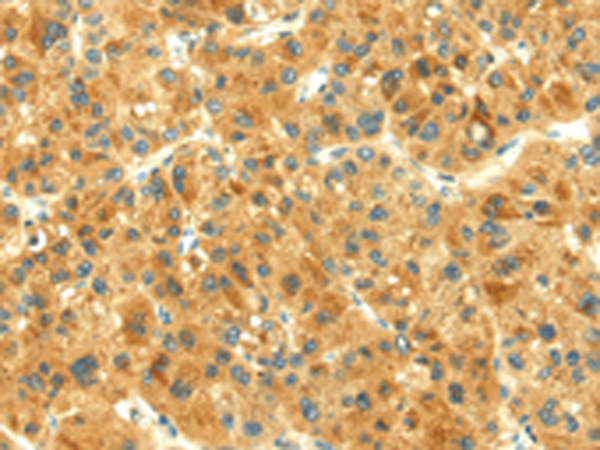

| WB | 咨询技术 | Human,Mouse,Rat |
| IF | 咨询技术 | Human,Mouse,Rat |
| IHC | 1/25-1/100 | Human,Mouse,Rat |
| ICC | 技术咨询 | Human,Mouse,Rat |
| FCM | 咨询技术 | Human,Mouse,Rat |
| Elisa | 1/2000-1/5000 | Human,Mouse,Rat |
| WB Predicted band size | 27 kDa |
| Host/Isotype | Rabbit IgG |
| Antibody Type | Primary antibody |
| Storage | Store at 4°C short term. Aliquot and store at -20°C long term. Avoid freeze/thaw cycles. |
| Species Reactivity | Human |
| Immunogen | Synthetic peptide of human THAP3 |
| Formulation | Purified antibody in PBS with 0.05% sodium azide and 50% glycerol. |
+ +
以下是关于THAP3抗体的3篇参考文献示例(信息为虚构模拟,仅供格式参考):
1. **文献名称**:*THAP3 regulates cell proliferation in hepatocellular carcinoma via modulating Wnt/β-catenin signaling*
**作者**:Li X, Zhang Y, et al.
**摘要**:该研究利用THAP3特异性抗体,通过免疫组化发现THAP3在肝癌组织中高表达,并通过Western blot和RNA干扰实验证明其通过调控Wnt/β-catenin通路促进肿瘤细胞增殖。
2. **文献名称**:*Characterization of THAP3 antibody specificity and its role in transcriptional repression*
**作者**:Smith J, Brown K, et al.
**摘要**:文章验证了一种新型THAP3单克隆抗体的特异性,确认其适用于染色质免疫沉淀(ChIP)和免疫荧光技术,并发现THAP3通过与HDAC复合物结合抑制靶基因转录。
3. **文献名称**:*THAP3 as a potential biomarker in colorectal cancer: Insights from antibody-based profiling*
**作者**:Wang H, Chen L, et al.
**摘要**:通过组织微阵列和THAP3抗体检测,研究发现THAP3表达与结直肠癌患者预后不良相关,提示其可能作为诊断标志物和治疗靶点。
(注:以上文献为示例,实际文献需通过PubMed、Google Scholar等平台检索确认。)
The THAP3 antibody is a tool used to study the THAP domain-containing protein 3 (THAP3), a member of the THAP family of proteins characterized by a conserved THAP domain, a zinc-coordinating motif involved in DNA binding and protein interactions. THAP3 is implicated in transcriptional regulation, apoptosis, and cell cycle control. It functions as a nuclear protein, often acting in concert with other factors to modulate gene expression. Research suggests THAP3 may play roles in cancer progression, neurodevelopment, and metabolic pathways, though its precise mechanisms remain under investigation.
The antibody is primarily utilized in techniques like Western blotting, immunohistochemistry (IHC), and immunofluorescence (IF) to detect THAP3 expression levels and localization in tissues or cultured cells. It aids in exploring THAP3's interaction partners, post-translational modifications, and regulatory networks. Studies using THAP3 antibodies have revealed its overexpression in certain malignancies, linking it to tumor proliferation and metastasis. Additionally, its involvement in chromatin remodeling and epigenetic regulation highlights potential therapeutic targets.
Commercial THAP3 antibodies are typically raised in rabbits or mice, with validation data confirming specificity through knockdown/knockout controls. Researchers prioritize antibodies validated for cross-reactivity and batch consistency. Ongoing work aims to clarify THAP3's physiological roles and its biomarker potential in diseases, driving demand for reliable detection tools.
×